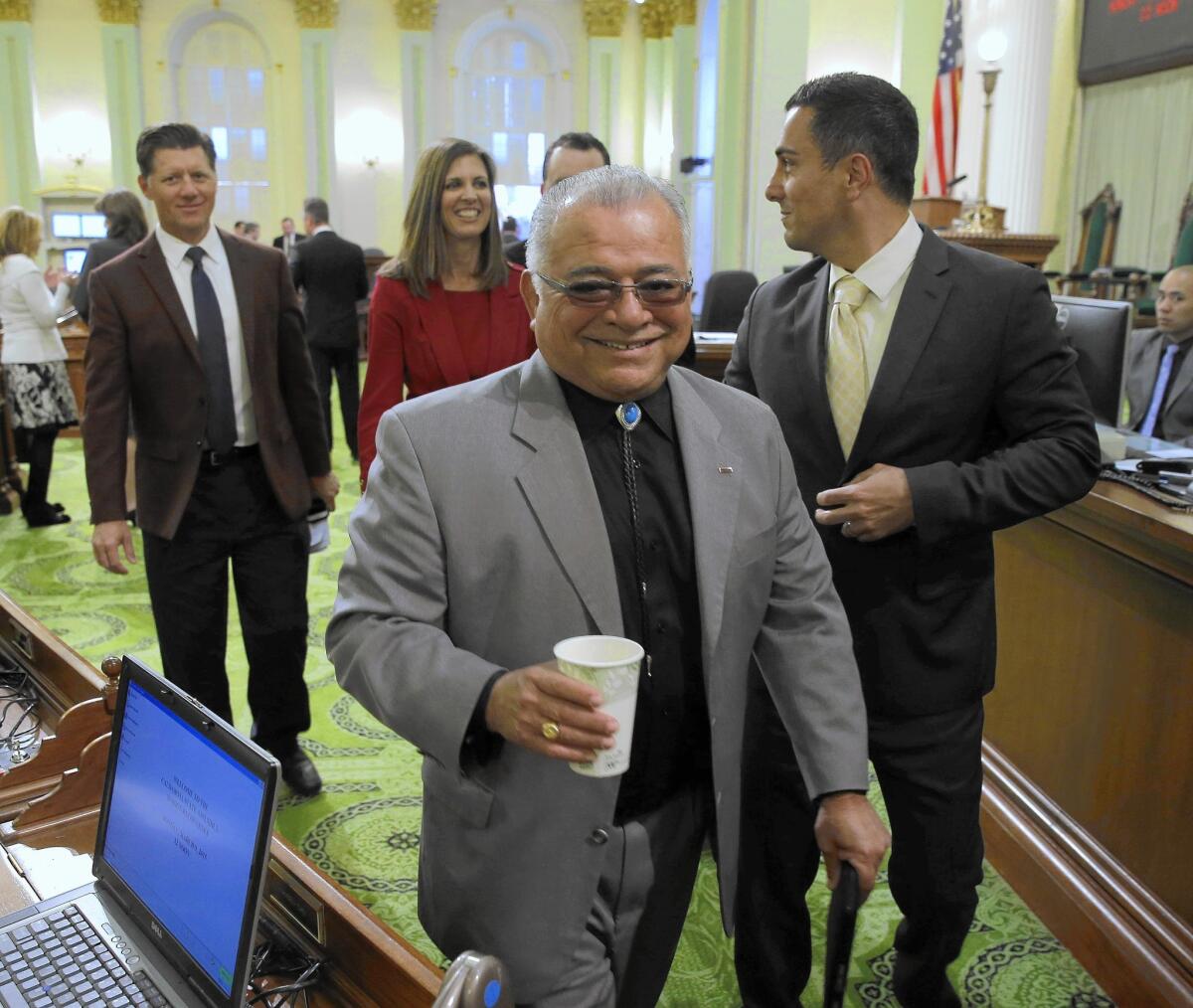Rocky Chávez cites Marine background as key asset in U.S. Senate race

- Share via
Rocky Chávez, a Republican state assemblyman from Oceanside, launched a campaign for U.S. Senate on Thursday, offering his military background as a key asset in the race to succeed Democratic incumbent Barbara Boxer.
Chávez, 63, a retired Marine colonel and former Oceanside City Council member, was the state’s acting veterans affairs secretary under Gov. Arnold Schwarzenegger. He also was a founder and director of a charter school in Oceanside, the northern San Diego County town that borders Camp Pendleton.
In a written statement, Chávez said his campaign would focus on national security, education and the economy.
“I’m a fighter who brings bipartisan support to issues and gets them solved,” he said.
The only other major candidate in the contest is state Atty. Gen. Kamala Harris, a Democrat and former San Francisco district attorney. Some lesser-known Democrats, including several U.S. House members and former Army Secretary Louis Caldera, are exploring whether to run.
Chávez faces long odds in a state that leans strongly Democratic. In the absence of other serious contenders, Harris has been steadily rounding up support since January. On Thursday, she scored the prized endorsement of California Professional Firefighters.
Chávez, who served 28 years in the Marines, took aim at Harris in his announcement, suggesting she was ill-equipped to handle such threats as the Islamic State terrorist group in the Middle East.
“If things get worse overseas,” he said, “who would Californians want representing them in the Senate? A lawyer from San Francisco or a Marine colonel who knows how lives can be protected and understands the importance of keeping America and her allies safe and secure.”
Harris spokesman Brian Brokaw said she “welcomes Assemblyman Chávez to the race and believes anyone should run for office if that’s how he or she believes California can be best served.”
Harris, who has a national fundraising base, is better positioned than Chávez to collect the millions of dollars needed to run a viable campaign in America’s most populous state.
In an interview, Chávez said optimistically that he planned to raise as much as $50 million.
Last year, donors gave just $4 million to Republican Neel Kashkari for his campaign to unseat Gov. Jerry Brown. And Chávez will be raising money under far stricter federal donation limits.
Were he to win, Chávez would be California’s first Latino in the U.S. Senate. After former Los Angeles Mayor Antonio Villaraigosa decided to skip the race, some members of the Latino Legislative Caucus expressed hope that another Latino Democrat would run.
In Sacramento, Chávez has sparred with the caucus, which has not let him join the group because he’s Republican.
But he could help the state Republican Party in its effort to shed an image as a domain of conservative white men.
On immigration, Chávez has split with the party’s conservative wing, backing steps to legalize the status of immigrants in the country illegally. His positioning on immigration is likely to limit his appeal to conservative voters in the June 2016 primary.
Chávez said he backs driver’s licenses for such immigrants, for instance, but voted against a bill that authorized them in a dispute over whether they would look different from other licenses.
Two former state Republican chairmen, Tom Del Beccaro and Duf Sundheim, are weighing whether to enter the Senate race.
Del Beccaro would likely run to the right of Chávez.
“I think it’s incumbent on Republicans to provide alternative policies to the Democrats’,” Del Beccaro said. “So the question becomes: Will Rocky do that as a candidate?”
Chávez was first elected to the Assembly in 2012. He introduced a measure, signed into law last year by Gov. Jerry Brown, that allows all veterans to be eligible for in-state tuition rates at UC and Cal State campuses.
[email protected]
Twitter: @finneganLAT
Times staff writer Melanie Mason in Sacramento contributed to this report.
More to Read
Sign up for Essential California
The most important California stories and recommendations in your inbox every morning.
You may occasionally receive promotional content from the Los Angeles Times.











